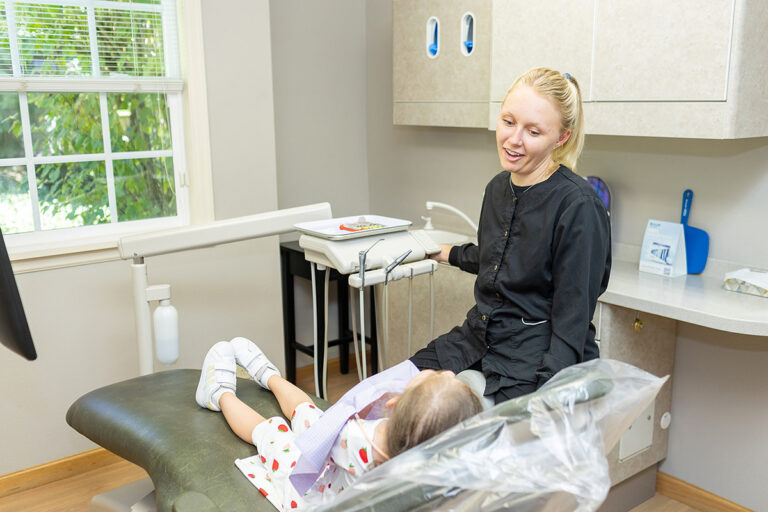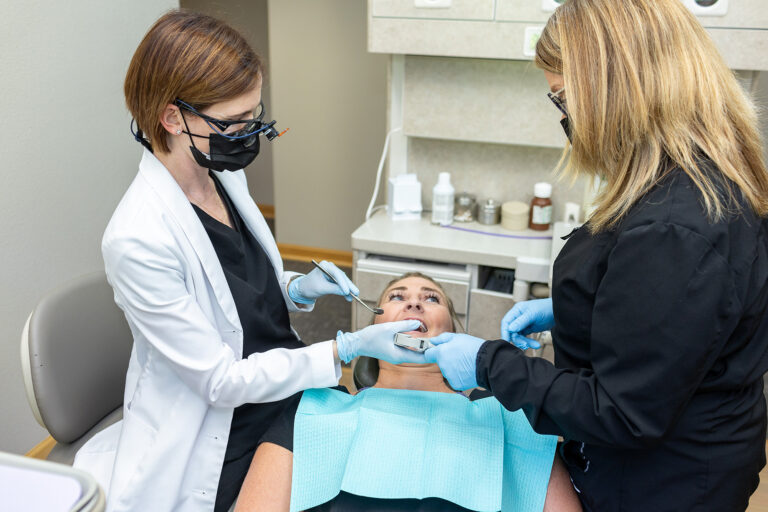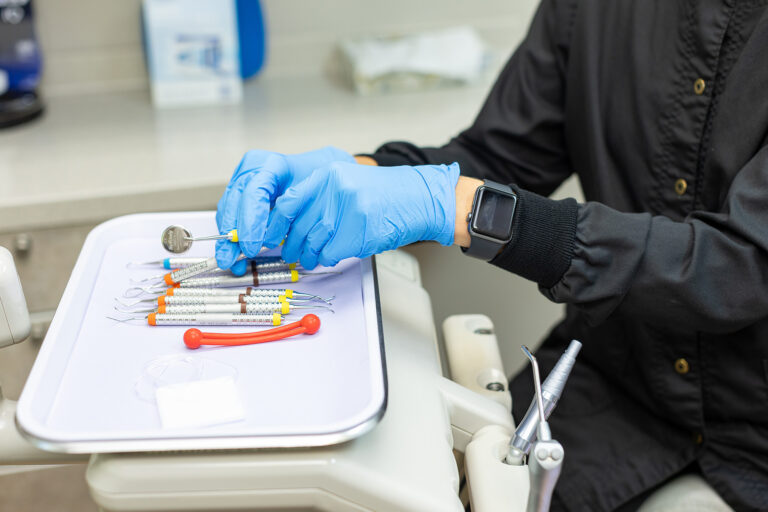Professional Dental Cleanings
Professional dental cleanings are an important part of a program to prevent gum disease and help you keep your teeth for a lifetime. Adults over 35 lose more teeth to periodontal (gum) disease than to decay. The best way to prevent periodontal disease is to have professional cleanings on a regular basis and to practice good oral hygiene with daily brushing and flossing techniques that are recommended by Dr. Matlock and your hygienist. Good oral hygiene can also help promote a healthier life. Recent studies strongly suggest a link between the bacteria that causes periodontal disease and some systemic diseases. For your continued health and wellness, it is very important to complete any recommended periodontal treatment as soon as possible. Our well-trained, professional hygienists are dedicated to your comfort and helping you maintain a healthy smile.
Dr. Matlock recommends regular cleanings and exams for all adults. The interval between cleanings is usually between 3 and 6 months, depending on the individual rate each patient accumulates plaque or calculus, and the level of inflammation or bleeding present. The interval between periodic exams is usually once per year.
Tips For Maintaining A Healthy Smile
- Brush twice a day with flouride toothpaste
- Clean between the teeth daily with floss
- Eat a balanced diet and limit snacks
- Visit Dr. Matlock regularly for a cleaning and exam

Children
We love children in our family practice and would like to have them come in for a “first dental visit” as soon as possible. The ADA encourages parents to take their child to the dentist when the first tooth appears. Most parents bring their children in for a first visit somewhere between ages 1-3, or when they think their child will feel comfortable.
The first dental visit will help your child know that coming to the dentist can be a fun experience! Usually we will use this visit to help your child become familiar with the office and having Dr. Matlock check their teeth. Depending on the age of your child, what is needed, and how comfortable your child is at the first visit, we may also complete a cleaning, fluoride, any necessary x-rays and education on brushing and flossing their teeth.
Dental decay is the most common chronic childhood disease. Approximately 25% of children have had cavities before entering kindergarten. To fight decay in children, the American Dental Association has updated their guidelines and recommends that parents and caregivers should brush their children’s teeth with fluoride toothpaste as soon as the first tooth comes in. Use a tiny amount (the size of a grain of rice) for children under age 3 and a pea-size amount of toothpaste for children 3 to 6 years old.
Dr. Matlock recommends regular check-ups every six months for all children including an exam, cleaning and any necessary x-rays in order to help prevent dental decay. Creating a preventive dental routine early can ensure a lifetime of healthy smiles for your child.
How To Maintain Your Childs Dental Health
- Schedule your child’s first dental visit as soon as possible to get them off to a good start
- Bring your child in every 6 months for cleanings and exams
- Encourage and help your child brush twice a day with fluoride toothpaste and floss daily
- Limit sugary snacks for your child
- Create a preventive dental routine early to ensure a lifetime of healthy smiles

Digital X-Rays
Dental x-rays are an important diagnostic tool to check for decay and damage that is not visible during an exam. Digital x-rays in our office utilize very low levels of radiation. A full series of 18 dental X-rays has 20 times less radiation than one year of normal background radiation from the environment. The 4 bitewing X-rays taken during dental check-ups have 79 times less radiation than a year of normal background radiation. To further minimize radiation exposure, we use a leaded apron and collar shield to protect your body. Dr. Matlock generally recommends a full series of x-rays taken every 3 to 5 years and bitewing x-rays once per year for most adults.

Exams
New Patients are always welcome in our family dental practice! Even if it’s been awhile since you have seen a dentist, it’s never too late to get back on track to having a healthy, beautiful smile.
At your initial visit in our office, we usually recommend a complete, comprehensive examination. This is a thorough examination of your gum tissue and teeth. All surfaces of your teeth will be checked for any sign of problems including decay or fracture. Dr. Matlock will also check your existing dental restorations such as crowns and fillings to make sure they are not in need of replacement. During the exam, Dr. Matlock will perform an oral cancer screening to check the lips, throat, tongue and gum tissue for any sign of oral cancer. Your gums and bone around the teeth will also be checked for any sign of disease. Dr. Matlock is able to give you solutions for all of your dental needs and options for any necessary treatment.

Sealants
A sealant is a thin, plastic coating applied to the chewing surface of a tooth to prevent decay from forming. Although brushing and flossing can help remove food and plaque from the smooth surfaces of the teeth, it is difficult to reach all of the depressions and deep grooves. Sealants protect the vulnerable areas by sealing out plaque and food and acting as a barrier to prevent cavities. A sealant creates a smooth, easy to clean surface.
Sealants are often recommended for children and teenagers because they are more prone to decay in the deep grooves of their teeth early in life. Most dental decay starts in these deep grooves because they are difficult to clean.
The procedure for applying sealants takes only a couple of minutes per tooth. The sealant material is a thin plastic applied to the chewing surfaces of the back teeth where decay occurs most often. It is carefully painted onto the enamel surface to cover the deep grooves or depressions. A special curing light is used to harden the sealant material, bonding it to the tooth. As long as it remains intact, it will protect against decay. Sealants are very durable and can last for years, but need to be checked for wear and chipping at regular dental visits. They may need to be replaced after several years.
Preventing Tooth Decay
- 25% of children have had cavities before entering kindergarten
- Sealants create a barrier to protect teeth from plaque and decay
- Preventive procedures are the best way to prevent tooth decay